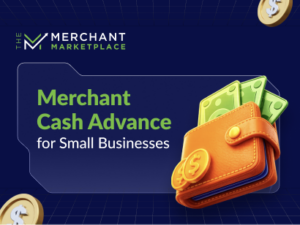Merchant Cash Advances have become a lifeline for small businesses that often face challenges securing traditional bank loans due to limited credit or collateral. The attraction lies in the ease and speed of accessing funds, with businesses typically receiving capital within 48 hours. Repayments are seamlessly handled, with a percentage of sales automatically deducted daily or weekly. This flexible, fast process provides an alternative path for businesses seeking growth without the complexities and delays of conventional financing.
What is a Merchant Cash Advance (MCA)?
A Merchant Cash Advance (MCA) is a dynamic financial solution where a business gets a lump sum of cash upfront in exchange for a slice of future credit card sales. It’s a lifeline for businesses needing quick capital, especially those that might not clear the hurdles of traditional loans. If you’re facing an urgent need for funds but traditional bank loans seem out of reach, an MCA could be your fast track to financial relief.
Importance of Understanding MCA for Small Businesses
For small businesses, understanding the mechanics of MCAs is key to maximizing their growth. MCAs provide quick and easy access to capital, allowing businesses to seize new opportunities. By fully grasping how MCAs work, business owners can make smart decisions, ensuring they harness this powerful tool to fuel their expansion while maintaining financial stability. With the right approach, MCAs can become a strategic asset for business success.
How to get a merchant cash advance?
The MCA process begins with the business applying for an advance. The application typically requires basic information about the business, including details about its credit card sales history. The MCA provider evaluates the business’s creditworthiness based on its sales volume rather than its credit score. If approved, the business receives a lump sum of cash, which is repaid through a percentage of daily sales.
Factors Affecting MCA Approval and Funding / Merchant Cash Advance Requirements
Several important factors influence approval for a merchant cash advance (MCA), a popular form of alternative financing for businesses.
- Strong Monthly Revenue: Demonstrating consistent monthly income is a positive sign that helps businesses secure an MCA, showcasing their capacity to repay efficiently.
- Healthy Credit Card Sales Volume: Businesses with robust credit card sales often gain quick approval for MCAs, benefiting from the ability to leverage their daily transactions for fast capital.
- Stable Cash Flow: A steady flow of income signals financial stability, making it easier for businesses to secure and comfortably manage an MCA repayment plan.
- Solid Operational History: A positive operational track record, even with existing debts like equipment loans, reflects reliability and responsible management, further boosting approval chances.
- Flexible Credit Score Requirements: With MCAs, businesses with less-than-perfect credit can still thrive, as these advances prioritize sales performance over traditional credit criteria.
- Tailored Financing Solutions: Choosing between an MCA and traditional loans empowers businesses to align funding with their unique needs, ensuring they access the best financial tools for growth.
Repayment Terms and Conditions
Repaying a merchant cash advance (MCA) works differently from traditional business loans. Instead of fixed monthly payments, a set percentage of your daily credit card sales—called the “holdback”—is taken until the advance is fully paid off. This holdback can range anywhere from 10% to 20%. Since the repayment depends on sales volume, the timeframe isn’t set in stone—more sales mean faster repayment, while fewer sales stretch it out. Unlike standard business financing with interest rates, an MCA uses a factor rate to figure out the total amount you’ll pay back, which is a unique approach in the world of alternative financing.
See if your business qualifies for an MCA today!
Benefits of Merchant Cash Advance
- Quick Access to Funding
One major perk of merchant cash advances is how quickly businesses can get their hands on funds. While traditional loans often drag out with long approval processes and piles of paperwork, MCAs cut through the red tape. The application process is much simpler, and businesses can usually expect approval and funding within just a few days.
- Flexibility and Convenience Merchant cash advances offer a lot of flexibility, letting businesses use the funds for whatever they need—whether it’s covering operational costs, buying inventory, or keeping cash flow steady during slow periods. The repayment setup, which adjusts with sales, adds another layer of convenience. When business is booming, payments rise; when business slows down, payments decrease. This flexibility helps businesses manage their cash flow more effectively, avoiding the stress of fixed payments.
- No Collateral or Credit Check Requirements Another big advantage of merchant cash advances is that they don’t require collateral, which is great for businesses that don’t have a lot of assets to put on the line. Plus, while traditional lenders are all about credit scores, MCA providers care more about how your sales are doing. This makes it a lot easier for businesses with bad or limited credit to get approved.
- Fast Application and Approval Process The MCA application process is built for speed and simplicity. Most providers just ask for basic business details and a few recent bank statements, which you can usually submit online. This cuts down on waiting time, so businesses can get the capital they need fast, right when they need it the most.
Types of Merchant Cash Advance
Traditional MCA
In a traditional MCA, repayment is handled by automatically taking a set percentage from the business’s daily credit card sales. This setup works well for businesses with steady credit card revenue because the repayment amount adjusts directly with their sales volume.
Automated Clearing House MCA
An Automated Clearing House (ACH) is not exactly a type of Merchant Cash Advance (MCA), but rather a short-term loan that functions similarly. The key difference lies in how the repayments are collected. While traditional MCAs deduct repayments directly from daily credit card sales, an ACH MCA deducts payments directly from the business’s bank account on a daily or weekly basis, regardless of whether the revenue comes from credit card sales or other sources. This makes ACH financing a good option for businesses with diverse revenue streams, not limited to just credit card transactions.
In essence, an MCA focuses on assessing cash flow through credit and debit card payments, whereas an ACH lender evaluates the overall sales proceeds of a business.
Split Funding MCA
Split funding, or lockbox MCA, splits credit card sales right at the processing point. A portion of each transaction is sent directly to the MCA provider, while the rest goes to the business. This approach streamlines the repayment process and ensures the MCA provider is paid straight from the sales.
Other Variations
There are other variations of MCAs, including hybrid models that combine features of traditional MCAs and ACH MCAs. Some providers offer customized repayment plans based on the specific needs and sales patterns of the business.
Pros and Cons of Merchant Cash Advance
Advantages of Merchant Cash Advance:
- Quick Funding: Businesses can receive funds in as little as 24 to 48 hours after approval. Easy as it gets!
- Easy Application: The application process is simple, with minimal documentation required.
- Flexible Repayment: Repayments are based on sales, so they fluctuate with the business’s revenue, offering flexibility during slow periods.
Disadvantages of Merchant Cash Advance:
Higher Rates, Faster Growth: While Merchant Cash Advances (MCAs) come with APRs ranging from 30% to 350%, they offer immediate access to capital, which can fuel business growth and opportunity. For many, the fast funding outweighs the cost.
Flexible, Yet Demanding: Daily repayments can align with your cash flow, easing the strain of fixed monthly payments. However, careful financial management is key to maintaining stability.
No Credit Check, But Be Cautious: Though MCAs skip credit checks, staying current on payments is crucial. Missing payments can still impact your credit and future financing prospects.
Contact us for a personalized consultation to weigh your options.
Alternatives to Merchant Cash Advance
- Traditional Loans
Traditional bank loans come with lower interest rates and longer repayment terms than MCAs. However, they demand strong credit and often involve a slow, drawn-out approval process.
- Invoice Financing
Invoice financing lets businesses sell their unpaid invoices at a discount to get cash fast. It’s a great option for those with outstanding receivables who need quick access to capital.
- Line of Credit
A business line of credit gives you a financial safety net, letting you dip into funds up to a set limit whenever you need. Unlike a traditional loan that gives you one lump sum, this credit line works more like a financial toolkit—you only use what you need and pay interest on just that amount. It’s a handy, flexible option for keeping cash flow smooth or tackling surprise expenses without the stress.
- Crowdfunding
Crowdfunding platforms allow businesses to raise capital from a large group of investors or customers. This method offers an alternative to traditional financing and business loans, helping you secure funds without incurring debt. Though running a successful campaign can be tough, it also builds a community of supporters and provides valuable feedback.
Best Practices for Choosing an MCA Provider
- Research and Comparison
Before picking an MCA provider, make sure to research various options and compare their terms, fees, and repayment structures. Seek out providers who are transparent about their offerings and make sure you fully understand all the associated costs.
- Understanding Fees and Terms
Thoroughly examine the factor rate, holdback percentage, and any extra fees tied to the MCA. It’s important to understand how these elements will affect your total repayment amount.
- Checking Reputation and Reviews
Take the time to read reviews and testimonials from other businesses that have used the MCA provider. Providers with glowing feedback and a solid reputation are more likely to be reliable and fair. Hearing about others’ experiences can give you a clearer picture of what to expect and help you choose a provider who delivers on their promises.
- Ensuring Transparency and Communication
Pick an MCA provider that is upfront about their terms and communicates clearly throughout the process. Good communication is key for handling any issues that might come up during repayment.
Download our checklist for selecting the right MCA provider.
Conclusion
Merchant Cash Advances (MCAs) offer a unique financing solution for businesses needing quick access to capital. Here’s a summary of the key takeaways:
An MCA is not a traditional loan but an advance against future credit card sales. It provides immediate funds to businesses in exchange for a percentage of future sales. Businesses apply for an MCA, and if approved, receive a lump sum of cash. Repayments are made daily or weekly based on a percentage of daily credit card receipts. MCAs provide fast access to funds, and flexible use of capital, and often require no collateral or rigorous credit checks. The application and approval process is typically swift.
There are several MCA types, including traditional, ACH, and split funding MCAs. Each has its own repayment structure and features. While MCAs offer quick funding and ease of access, they come with high interest rates and fees, and they may not contribute to building business credit. Daily payments can also strain cash flow. Other financing options include traditional loans, invoice financing, lines of credit, and crowdfunding. Each has different terms and suitability depending on business needs. Selecting the right MCA provider involves researching options, understanding fees, checking reputations, and ensuring clear communication.
By understanding Merchant Cash Advances (MCAs) and how they align with your sales patterns, you can make a smart, informed decision. Consider the benefits of fast, flexible funding, and explore all options to find the best solution for your business needs.
Ready to explore your funding options? Try MCA today!
Importance of Careful Consideration and Research
Before you commit to an MCA, it’s important to understand the terms and see if it suits your business’s financial situation and goals. Take the time to research and compare options to make the best choice.
Final Thoughts on MCA as a Funding Option
MCAs can be a powerful resource for businesses seeking rapid access to capital. When used wisely, they are well-suited for short-term financing, especially when the business has a clear plan to generate a strong return on investment. With careful planning, MCAs can help businesses seize opportunities and fuel growth.
In summary, if you’re going through a cash flow crunch and traditional financing isn’t an option, an MCA could offer the speed and flexibility you need. However, it’s essential to be fully aware of the costs and risks involved. By doing your homework and understanding how MCAs work, you can make an informed decision that could turn your financial challenges into opportunities for growth.
Ready to get started? Speak with one of our funding experts today!
FAQs: Frequently Asked Questions About MCA
What is a Merchant Cash Advance (MCA)?
A Merchant Cash Advance (MCA) is a dynamic financial solution where a business gets a lump sum of cash upfront in exchange for a slice of future credit card sales. It’s a lifeline for businesses needing quick capital, especially those that might not clear the hurdles of traditional loans. If you’re facing an urgent need for funds but traditional bank loans seem out of reach, an MCA could be your fast track to financial relief.
How Does MCA Repayment Work?
Repaying an MCA is designed to be flexible and tied to your daily or weekly credit card sales. Instead of fixed monthly payments, repayments fluctuate with your sales volume. If your sales soar, you’ll pay off the advance faster. Conversely, your repayments adjust during slower periods to ease the pressure on your cash flow. It’s a tailored approach that matches the rhythm of your business.
What Are the Costs Associated with an MCA?
MCAs operate differently from traditional loans; they don’t come with interest rates. Instead, they use a factor rate to calculate the total repayment amount. This factor rate can be substantial, potentially leading to significant costs over time. Understanding this rate thoroughly and comparing it with other business financing options is crucial to avoid surprises.
Can I Qualify for an MCA with Bad Credit?
Absolutely! MCA providers are more interested in your business’s credit card sales performance than your credit score. This makes MCAs an attractive option for businesses with less-than-stellar credit histories. If traditional loans are out of your reach due to poor credit, an MCA might just be the opportunity you need to boost your business’s financial standing.
What Are the Risks of Using an MCA?
While MCAs offer quick access to capital, they come with their own set of risks. The high factor rates can lead to significant repayment amounts, potentially straining your cash flow. Additionally, the daily or weekly repayment structure can create a cycle of debt if your sales don’t meet expectations. It’s crucial to weigh these risks carefully and ensure you have a robust plan for managing repayments.




